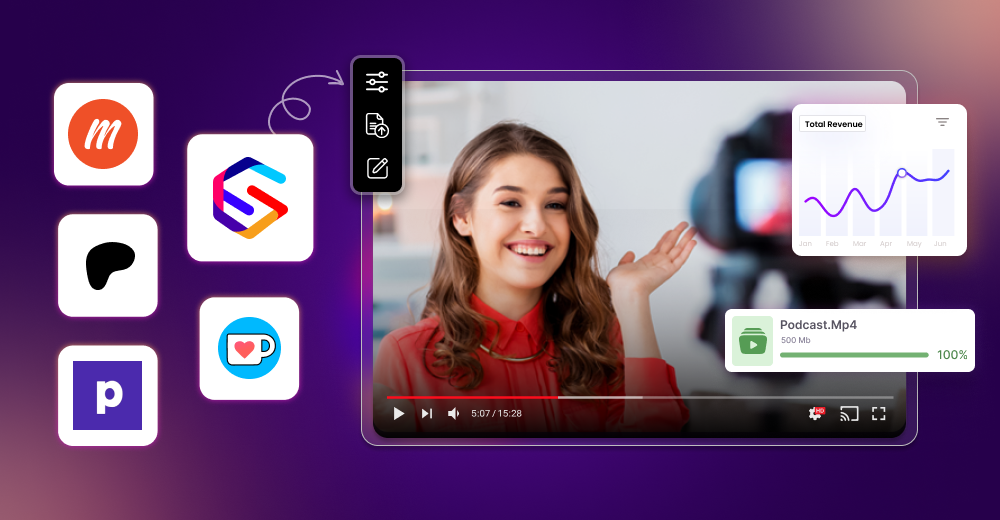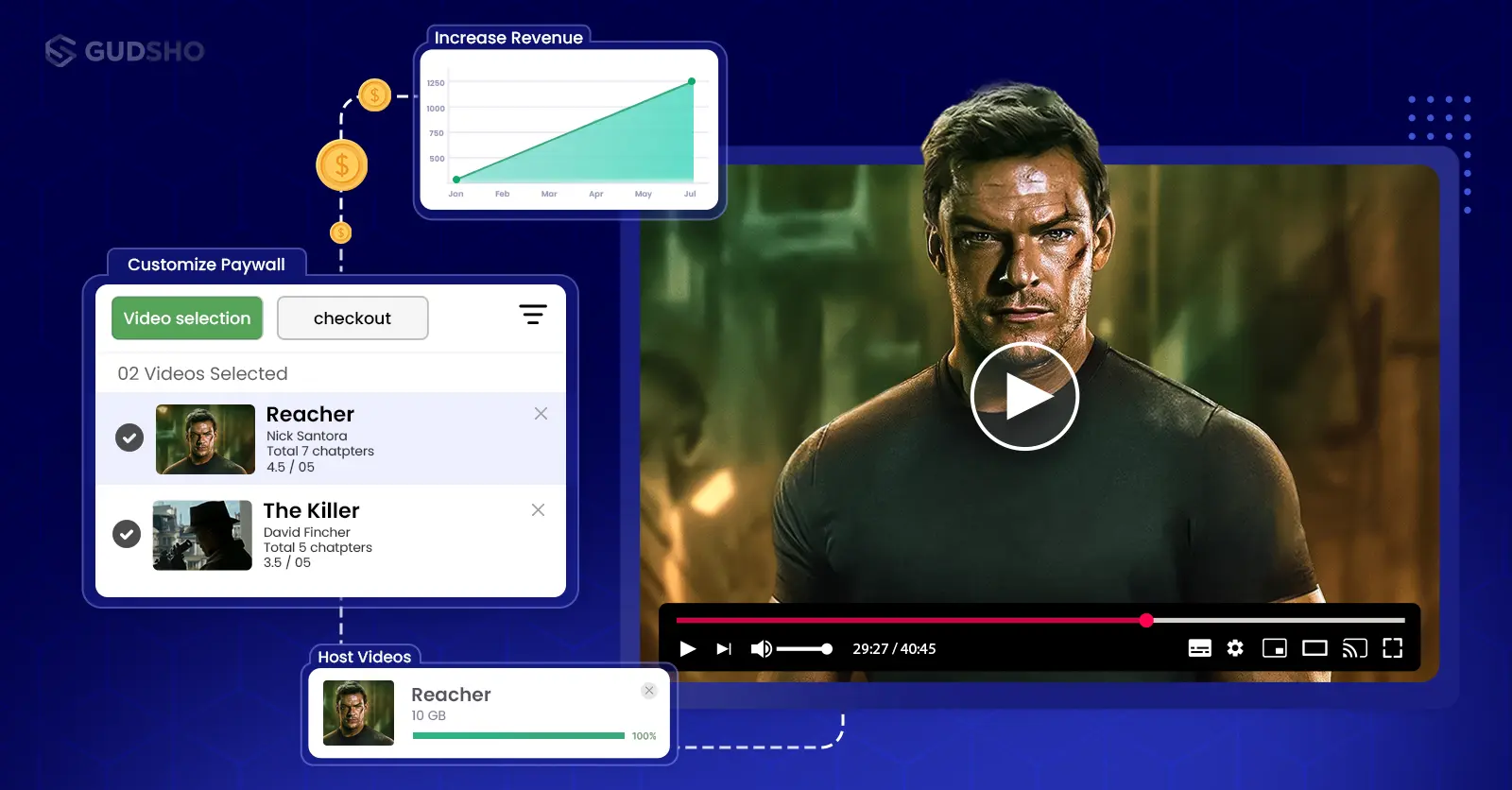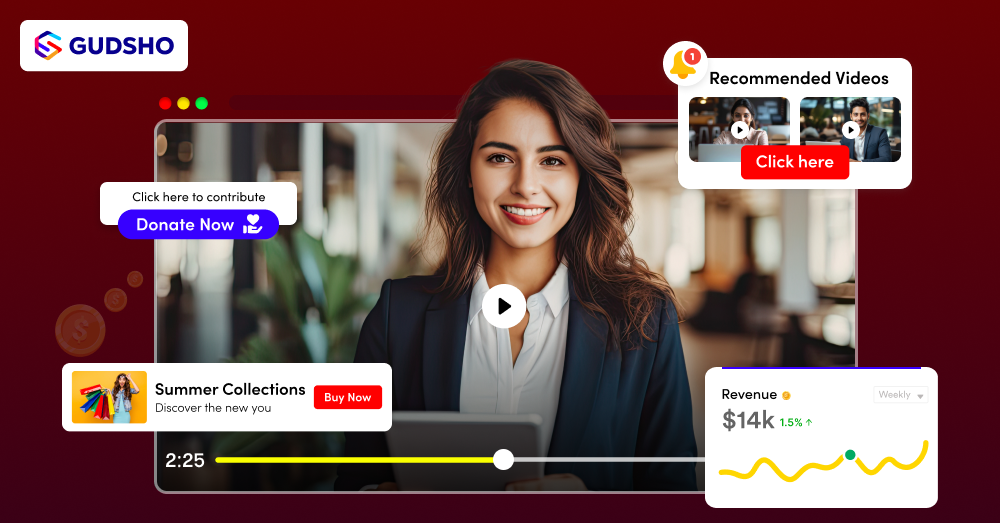Top 10 YouTube Alternative Platforms 2024 [Updated]
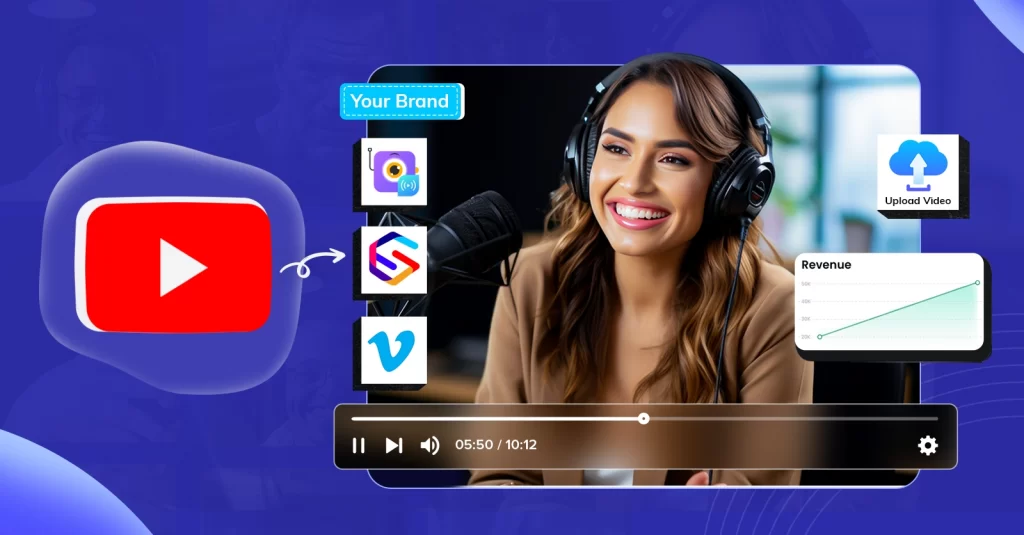
Youtube is the second popular social channel with 2.49 billion monthly users. So, isn’t it obvious that YouTube has been considered the best platform with various monetization plans for creators? But now that there are lots of hurdles, setbacks, and potential legal actions that come with being a YouTuber, creators have started to look for youtube alternatives. Another notable fact is, YouTube Premium hitting 100 million subscribers in 2024.
Though there are plenty of video platforms like YouTube available, creators still feel that the monetization system lacks transparency and that YouTube’s interests are not always aligned with creators’ interests when it comes to generating sustainable income from their content on the platform.
Best YouTube Alternatives
- GUDSHO – 5x Your Revenue And Reach
- Getshow – Own Your Content, Make Your Mark
- Vimeo – Where Creators Thrive And Connect
- Patreon – The Heart Of Creator-Fan Relationships
- DTube – Content Freedom With Crypto Rewards
- BitChute – Free Speech Finds Home
- LBRY – Discover, Share, Explore – Freely
- PeerTube – Empowers Video Independence
- Twitch – More Than Just Games’ Streaming
- Dailymotion – Gateway To Global Viewership
Best YouTube Alternative Platforms for Content Creators
1. GUDSHO: Own Your Audience & 5x Your Revenue And Reach
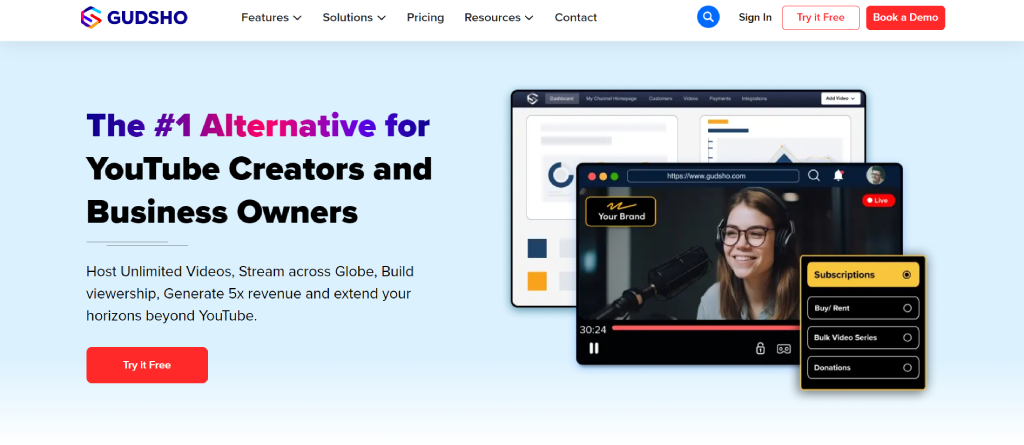
GUDSHO is one of the best YouTube alternative platform that lets creators host, manage, market, and monetize videos. There is no need to worry about eligibility criteria, hurdles, or privacy concerns to earn on GUDSHO, as you can do it effortlessly from day one.
You no longer have to give your cut for streaming your video content, rather you can own your channel and monetize your expertise the way you want. Get benefited from a tailor-made 360 video marketing toolkit that helps creators analyze video performance with an analytical dashboard.
| Founded | GUDSHO was first launched in 2019. |
| Video Quality | 4K Ultra HD streaming, low-latency movie streaming, and adaptive bitrate over HTTP. |
| Best for | Video Creators, Business Leaders, Artists, religious services, elite YouTubers, edutech, films, and fitness influencers. |
| Ad Free | Yes |
| Average Monthly Visits | 26.8 thousand |
| Monetization Models | Pay-Per-view, SVOD, TVOD, AVOD, Rent, Donation, Live to On-demand conversion. |
| Our Research | Built into the Video CMS is the capability to effortlessly upload, organize, and stream videos, coupled with secure video content delivery featuring 256-bit Bank-Level Encryption and compatibility across multiple DRM systems. |
| Pros | Prevents content piracy with AES Video Encryption, Anonymous Proxy Detection, private viewing, and restricted screen recording. |
2. Getshow: Own Your Content, Make Your Mark
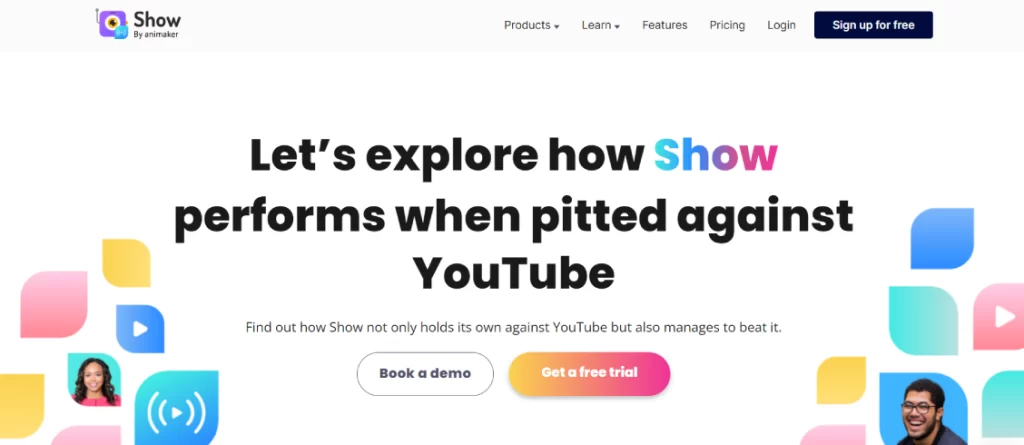
Getshow enables creators to have complete control over their video material, enabling them to strengthen their brand. Tailor your video players to make a lasting impression on your viewers.
Take control of your design and content to Show by Animaker is a video platform like youtube that positions itself as a contender against YouTube. It is considered the best YouTube alternative as it enables creators to have complete control over their video material, enabling them to strengthen their brand.
Show helps you to Tailor your video players to make a lasting impression on your viewers. Take control of your design and content to create a unique watching experience that makes you stand out. It’s revolutionary for artists trying to make a name for themselves online.
| Founded | Show was first launched in 2011. |
| Video Quality | It supports 5G, 8k videos, and even low bandwidths easily. |
| Best for | Video Creators, business, and marketing. |
| Ad Free | Yes |
| Monetization Models | Nil |
| Our Research | It is an email marketing, video hosting, LMS, and video lead generation platform that prioritizes video-first marketing, featuring video prospecting capabilities. |
| Pros | Show AI feature to run highly effective automated video campaigns with Data and live analytics. |
| Cons | No monetization models and live streaming. |
Bonus Tip:
Construct narratives that have hidden or deeper meanings, encouraging viewers to revisit your video for new insights.
3. Vimeo: Where Creators Thrive and Connect
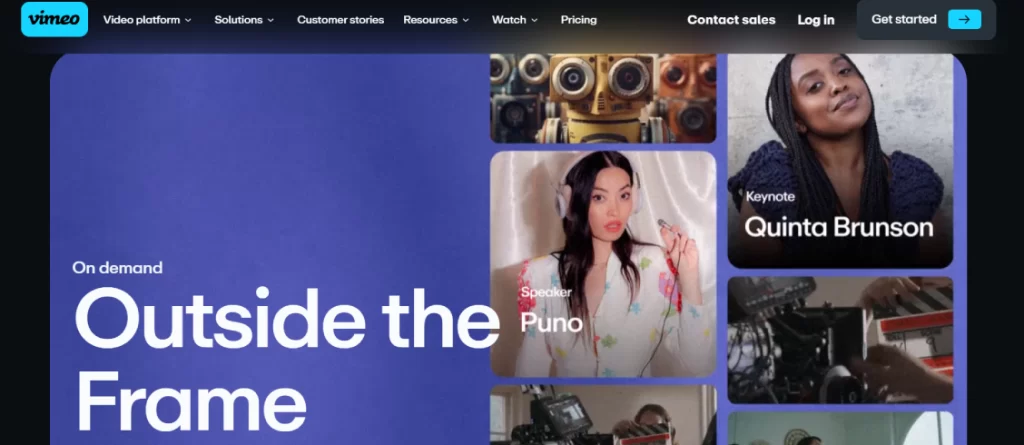
Vimeo, a well-known YouTube alternative, offers a versatile platform for creators. It’s loved for its user-friendly interface. Vimeo is considered one of the top sites like YouTube because it offers a simplified video management solution, allowing you to host, manage, and share brilliant videos. This platform serves as a secure, centralized, and AI-powered video hub that streamlines video creation and distribution. It simplifies video reviews with time-coded notes and frame-by-frame navigation for precise feedback.
Also, Furthermore, Vimeo helps creators by sharing outstanding videos and creating their own OTT platform to monetize content and grow their subscriber base.
| Founded | Vimeo was launched in 2004. |
| Users | 300 Million |
| Video Quality | 4K, 8K HDR, and with Dolby Vision |
| Best for | Video creators, Enterprises, Small Businesses, Creative Professionals, Educators, Marketers Corporate Comms, Learning and Development. |
| Ad Free | Yes |
| Average Monthly Visits | 71.9M |
| Monetization Models | Vimeo OTT offers monetization models like Subscription VOD Platform (SVOD)Transaction VOD Platform (TVOD)Advertising VOD Platform (AVOD)Free VOD Platform (FVOD) and pay-as-you-go-model. |
| Our Research | It offers specialized, modern solutions with unique features such as Vimeo Venues and Vimeo integration to enhance productivity. |
| Pros | AI-powered script generator and editing tool to manage your video CMS needs. |
| Cons | No video platform API to integrate videos on other websites. |
4. Patreon: The Heart of Creator-Fan Relationships
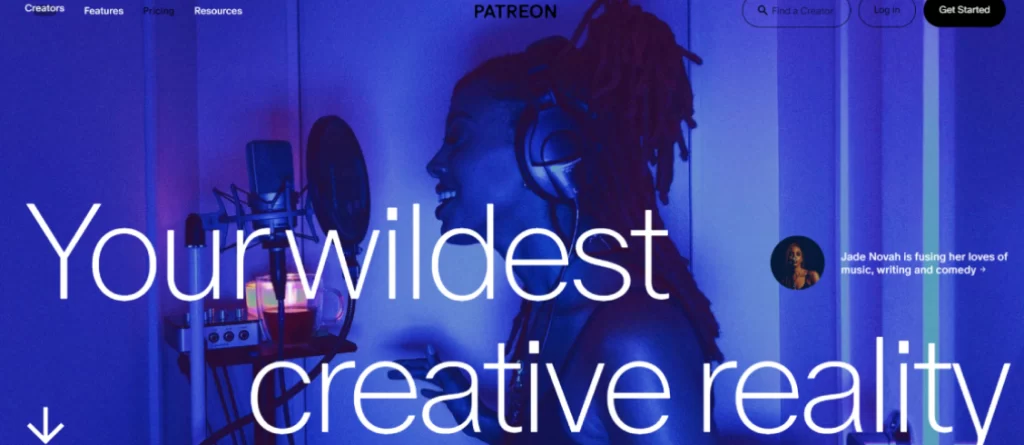
Patreon is a digital platform, and the best alternative to YouTube, designed for creators to cultivate a thriving community with their devoted fan base, sharing exclusive work and transforming passion into a sustainable creative business. As part of revenue generation, creators can choose to launch their digital shop for free or through paid membership.
With Patreon, anyone can start for free, create videos on their terms, and expand their community. Patreon serves as your creative home online, where fans can explore your latest work, connect through community group chats, and browse digital products in your shop.
| Founded | Patreon was launched in 2013. |
| Users | 250,000 Users. |
| Video Quality | 4K |
| Best for | Podcasters, video creators, musicians, artists, and game devs. |
| Ad Free | Yes |
| Average Monthly Visits | 9.5 Million |
| Monetization Models | Creators can convert free to paid membership. |
| Our Research | Notify your fans directly by sending updates on your latest videos, podcasts, art, music, articles, games, or anything else straight to their feeds and inboxes, without being blocked or buried by gatekeeping algorithms. |
| Pros | Built-in polling, insights, and analytics help you track and monitor your fans’ responses to your work, fostering engagement. |
| Cons | Fewer monetization models for creators. |
Bonus Tip:
Think beyond background music. Experiment with the ambient sounds and noises that can enhance the mood of your video.
5. DTube: Content Freedom with Crypto Rewards
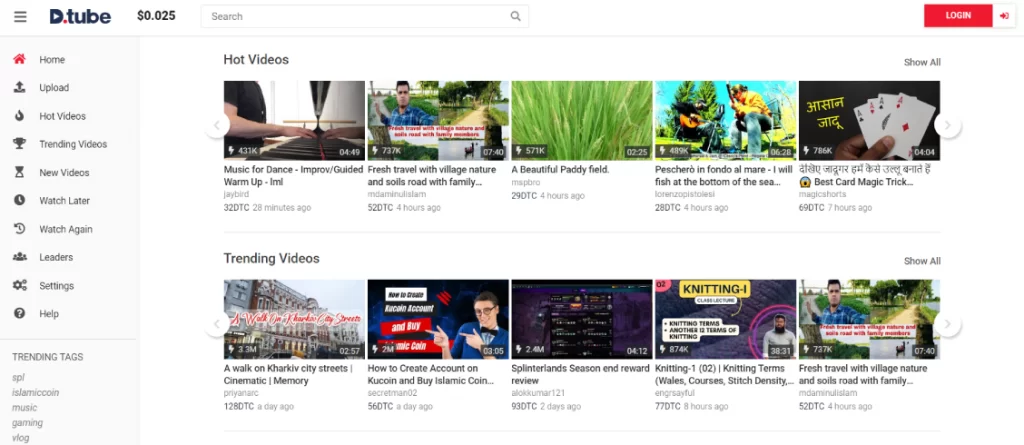
DTube is one of the leading decentralized video streaming platforms built on blockchain technology, that offers creators a choice to YouTube.
It offers an open content policy and intellectual property rights, allowing users to earn cryptocurrency rewards for their contributions. With a focus on decentralization, it’s a unique space for those looking for ads free, and blockchain-powered alternative to traditional video platforms like YouTube.
| Founded | Dtube was launched in 2017. |
| Users | 189,000 |
| Video Quality | 4K |
| Best for | Every content creator who cannot earn enough money from YouTube. |
| Ad Free | Yes |
| Average Monthly Visits | 2.1 million monthly unique visitors |
| Monetization Models | DTube uses blockchain technology to reward creators with cryptocurrency, through the STEEM blockchain and its native currency, as well as through donations and advertisements. |
| Our Research | It allows creators to share videos without relying on a central authority or corporate oversight. |
| Pros | Creators earn cryptocurrency rewards in DTube through engagement with their content. |
| Cons | No video marketing and less video monetization models. |
6. BitChute: Free Speech Finds Home
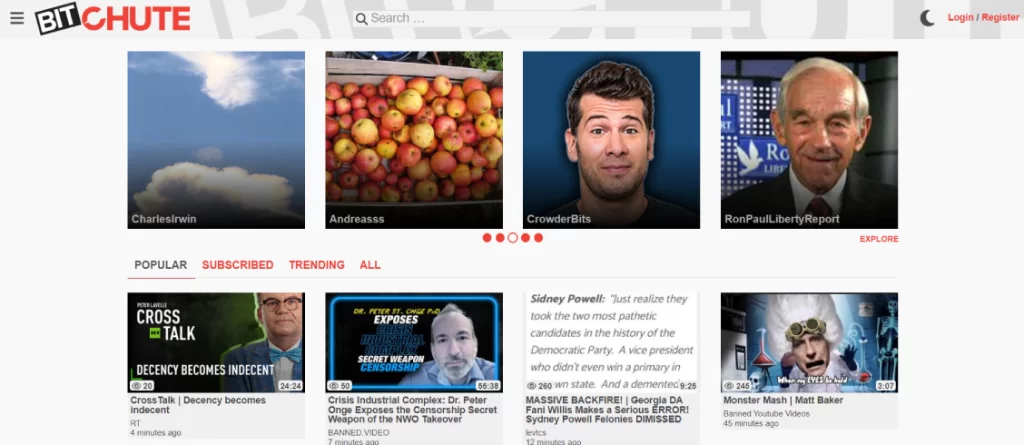
BitChute is widely recognized as a go-to alternative to YouTube, valued for its steadfast support on free speech.. The best thing about this platform is its liberty towards censorship. This freedom, along with a diverse range of content, attracts those who appreciate a more open and unrestricted space for sharing and discovering videos.
| Founded | Bitchute was launched in 2017. |
| Users | Up to 8k |
| Best for | Creators who prefer freedom of speech, hosting far-right individuals, conspiracy theorists, and hate speech. |
| Ad Free | Yes |
| Average Monthly Visits | 57.97M |
| Monetization Models | Offers various models like Bitchute subscriptions, Tips, affiliate marketing, sponsorships and merchandise sales. |
| Our Research | Offers freedom of expression by not imposing strict content guidelines or engaging in content moderation. |
| Pros | Content remains accessible even in the face of server takedowns or other disruptions. |
| Cons | Fewer features, resources, and opportunities. |
7. LBRY: Discover, Share, Explore – Freely
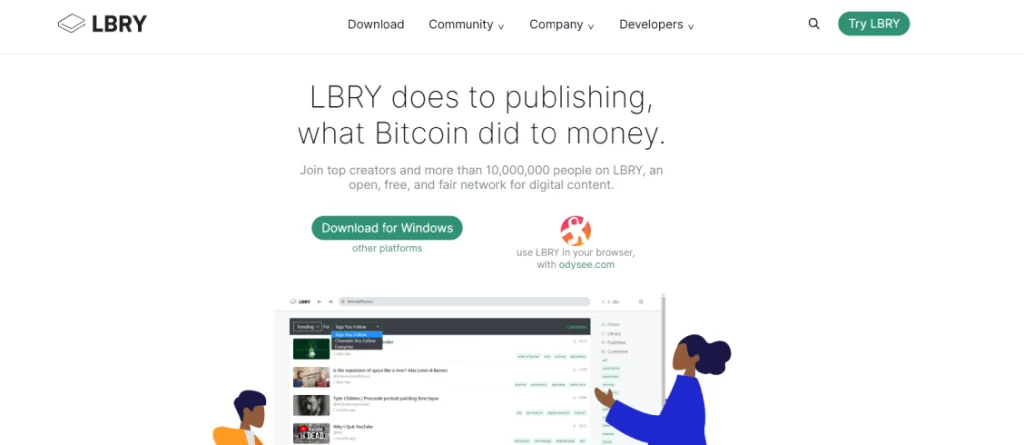
Often dubbed as Library – LBRY – is a blockchain-based platform for content sharing. It offers creators a decentralized and censorship-resistant space to publish videos and other content. Users can discover a wide range of media without the constraints of a central authority. It’s an awesome place to discover delightful and dazzling content all in one space.
| Founded | LBRY was launched in 2015. |
| Users | 10,000,000 |
| Best for | Video Creators |
| Ad Free | Yes |
| Monetization Models | No |
| Our Research | The LBRY Foundation is a non-profit organization dedicated to the development and adoption of the LBRY network. |
| Pros | LBRY operates without a central authority or single point of control, which produces several benefits. |
| Cons | It depends on a combination of community moderation and algorithms to identify inappropriate content. This method might result in inappropriate content slipping past filters or legitimate content being inaccurately categorized. |
Tired of using YouTube?
8. PeerTube: Empowers Video Independence
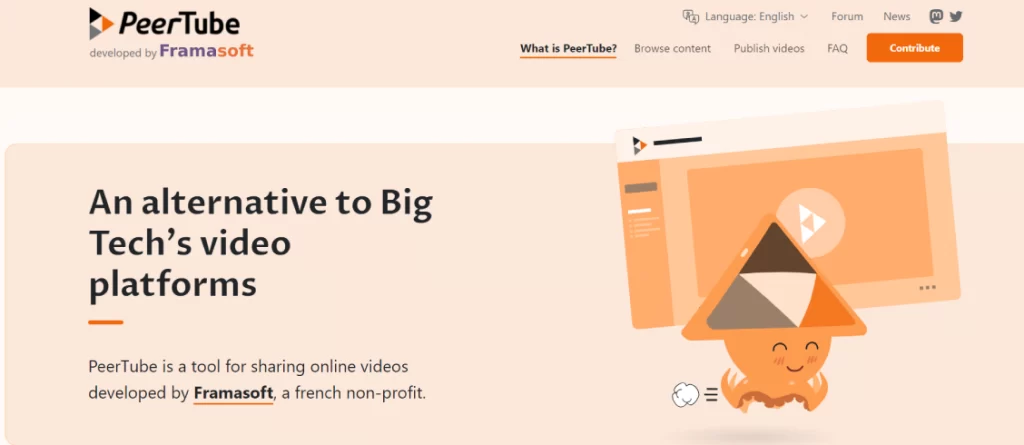
With PeerTube, sharing, hosting, and watching videos is possible without a central server. It operates on an interconnected network, where multiple instances host content, providing greater control and autonomy to users.
PeerTube focuses on user privacy, Resilience to censorship, and collaborative moderation. Its interconnected model enables collaboration among instances while allowing each instance to have its own rules and policies.
| Founded | Peertube was launched in 2015. |
| Users | 150,000 Users |
| Video Quality | 4K |
| Best for | Content creators, small and medium-sized organizations, Tech Communities, Privacy and Censorship Resistance, and Special Interest Groups. |
| Ad Free | Yes |
| Average Monthly Visits | 318K |
| Monetization Models | No |
| Our Research | It supports diverse content types, including videos, livestreams, and user-generated content, catering to diverse interests and communities. |
| Pros | PeerTube gives you the liberty to not please the algorithms by artificially altering your content. |
| Cons | It has a smaller user base and less content available. |
9. Twitch: More Than Just Games’ Streaming
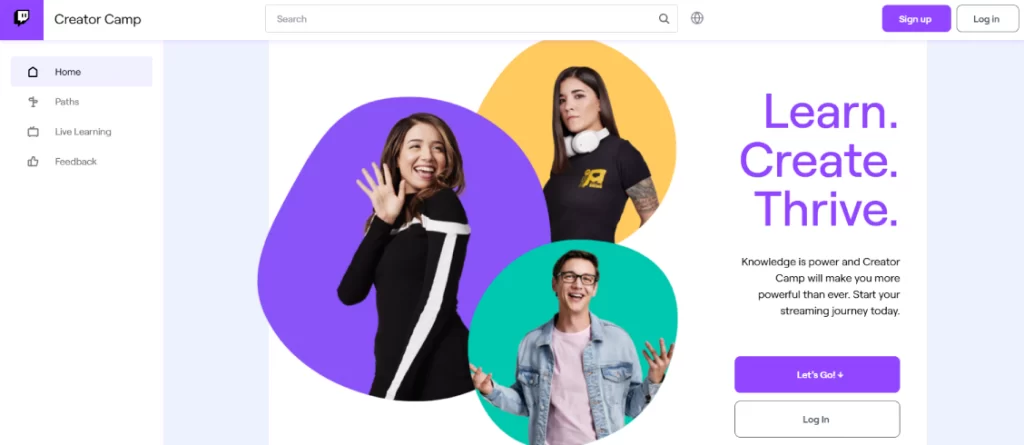
Twitch is a live video streaming platform, that is a YouTube alternative site that unites millions of users to engage in various activities and explore a wide array of content. The content ranges from Gaming to Creative categories such as Music, Art, Food & Drink, and much more.
Thanks to engaging discussions, subscriptions, and contributions, it provides a platform for creators to engage with their audience while doing what they love. It helps you to broadcast your content and provide your audience with an immersive viewing experience.
| Founded | Twitch was launched in 2011 |
| Users | 140 Million |
| Best for | Live broadcasting and community interaction. |
| Ad Free | No |
| Average Monthly Visits | 31 Million Visitors |
| Monetization Models | Creators can monetize premium content through various avenues, including subscriptions, donations (via bits), ad revenue sharing, and affiliate and partner programs. |
| Our Research | Twitch enables creators to broadcast content in real-time, promoting interaction between creators and viewers through live chat, emotes, and donations. |
| Pros | You can promote video content into different genres such as Games, IRL (In Real Life), Music, Esports, and various creative forms, making it easier for viewers to explore content. |
| Cons | Twitch has faced criticism for inconsistent content moderation. |
Bonus Tip:
Craft narratives that don’t provide all the answers, leaving room for viewer interpretation and discussion.
10. Dailymotion: Gateway to Global Viewership
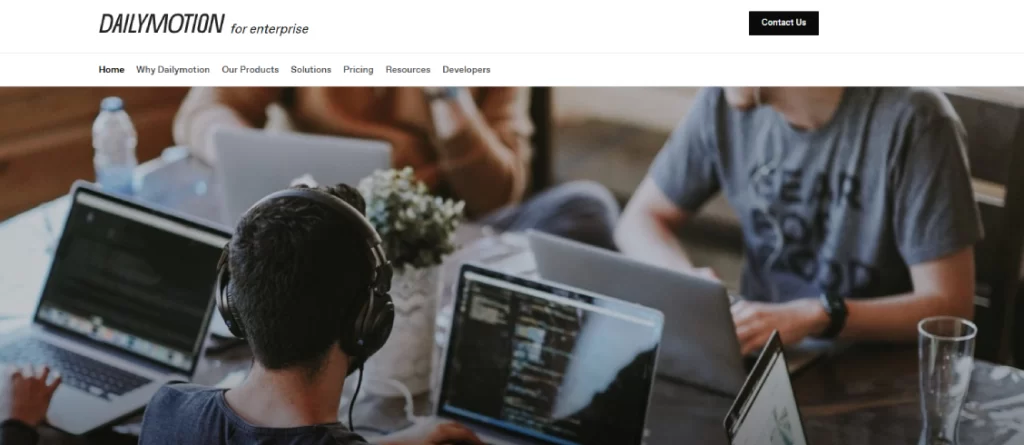
Dailymotion lets you host videos on an official channel that gives you the ability to extend your brand presence, then you can opt for Dailymotion. It is a global video streaming service that provides personalized content from news and entertainment. It is a wholesome digital space, where you can upload video content easily. You can get paid for the length of the time each viewer spends on your video.
| Founded | Dailymotion was launched in 2005 |
| Users | 300 Million |
| Video Quality | 4K |
| Best for | Brand, media, public personality, or organization. |
| Ad Free | No |
| Average Monthly Visits | 400 Million |
| Monetization Models | Offers several monetization options for advertising revenue, and partner programs. |
| Our Research | You can publish, broadcast, Retail/E-commerce sales videos and can also create your OTT platform with the brand-centric white-label video player. |
| Pros | Offers a comprehensive range of services like functional dive, API & SDK overview, and best practice integration. |
| Cons | Dailymotion has encountered criticism regarding its response to copyright infringement concerns. |
Conclusion
Thus, we find ourselves at the nexus of innovation and creativity. It is our responsibility as creators to push the envelope, explore YouTube alternatives, and reinvent the craft of content production.
The huge and boundless digital universe is just waiting for your voice and ideas. Get inspired by the idea that your creative potential has no bounds, let’s set off on this adventure together.
Stretch yourself and let your creativity run wild.
FAQ
What are YouTube alternatives?
YouTube ranks high in the video hosting and streaming industry, but there are several alternative platforms worth exploring to find the ones that suit your needs. There are lots of better YouTube alternatives available in the market including GUDSHO, Vimeo, Patreon, Show, and Twitch. Each of these video platforms offers a unique selling point that includes features related to user demographics, marketing strategies, and analytical reporting, serving differently to the expectations of content creators and viewers.
Why are Creators choosing YouTube Alternatives?
Rather than gathering solely on one platform, creators are choosing YouTube alternatives for several reasons. These include dissatisfaction with YouTube’s privacy policies, problems with demonetization, a quest for more creative freedom and freedom of speech, and the chance to connect with niche audiences not easily reached on YouTube.
Why are Creators choosing YouTube Alternatives?
Rather than gathering solely on one platform, creators are choosing YouTube alternatives for several reasons. These include dissatisfaction with YouTube’s privacy policies, problems with demonetization, a quest for more creative freedom and freedom of speech, and the chance to connect with niche audiences not easily reached on YouTube.
What are the subscription models, if any, offered by these alternative platforms for creators and viewers?
Subscription models may vary depending on the platforms you choose. Some offer subscription-based monetization model ( SVOD) options for creators to monetize their content directly from viewers, and many other models, while others may have premium subscription tiers for viewers to access ad-free content or exclusive features.
How do the user interfaces and navigation experiences of these alternative platforms differ from YouTube?
The user interfaces and navigation experiences of alternative platforms often differ from YouTube. Some may prioritize the discoverability of content through algorithm-curated playlists or libraries, while others focus on simplicity and ease of use.
How do the advertising opportunities on these alternative platforms compare to YouTube’s AdSense program?
While some platforms offer similar ad revenue-sharing models like AVOD, others may provide alternative monetization options such as sponsorships, donations, merchandise, affiliate marketing, or content partnerships. The effectiveness and reach of ad campaigns differ depending on the platform’s viewer database, demographics, preferences, and marketing strategy.

